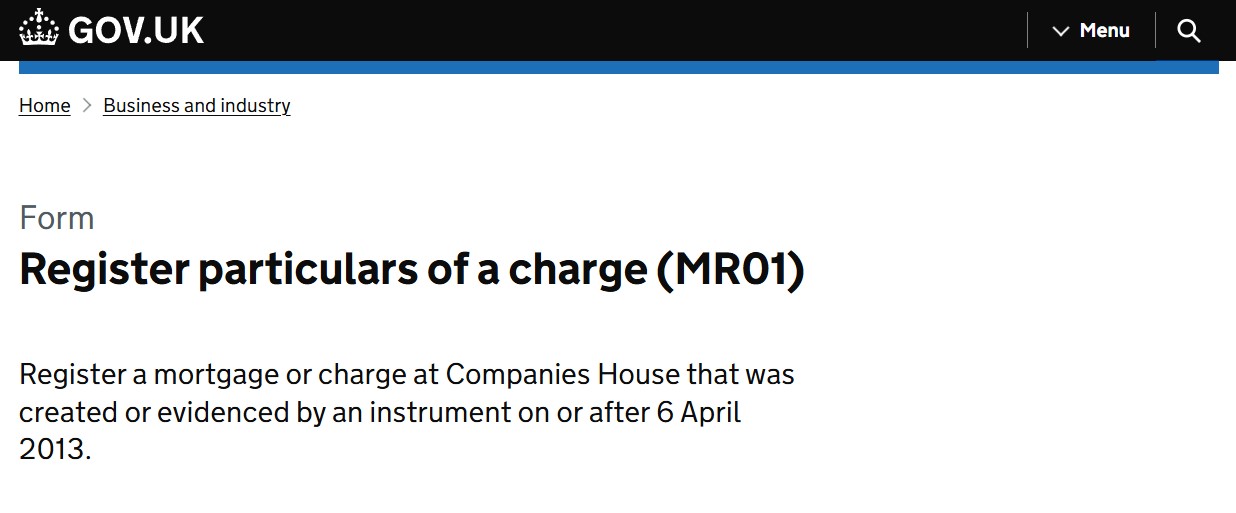Last Updated on December 20, 2024 by admin

UK company formation for just £0.99 and get your UK virtual office address for only £0.88 – available for both UK and non-UK residents!
In the business landscape, a company conducts different financial transactions to fulfill its financial responsibilities and secure assets. For accountability and financial risk involved in securing funds, such transactions have to be properly recorded and availed to appropriate persons. One such requirement is to register a charge with Companies House. A company should consider this practice, but why should a company register a charge? Let’s explore why a company would register a charge with Companies House.
What is a charge?
In simple terms, a charge refers to any security or guarantee that a company provides over its assets to secure a loan or other financial obligation. Such a charge may either be a non-moving asset entailing land, houses, or machines, or it could be a moving asset like a stock, debtors, or even patents.
Usually, a charge is created in favor of the lender over the assets of the borrowing company. For the lender, such charges are important as they provide confidence that the money lent will not go to waste and will be paid back as demanded.
What are the main types of charges that can be registered with Companies House?
In the UK, it is important to understand the types of charges you can register with Companies House. The two main types of charges that can be registered are as follows:
1. Fixed charge
A fixed charge is a form of security interest that can be created over certain assets of the company. The company is not allowed to sell, create any rights in the charged property or otherwise deal with the property without the permission of the charge holder. Usually, a fixed charge is imposed over certain specified assets which are:
- Land or buildings
- Equipment and machinery
- Vehicles
- Due to particular sales
2. Floating charge
A floating charge is a class of security that does not attach itself to specified assets. It also undergoes alteration periodically over time. It applies to a pool of assets that a company may use in its ordinary course of business, such as:
- Stock-in-trade
- Inventory
- Accounts receivable
A floating charge “floats” over these assets until the charge holder enforces the charge, at which point it crystallises and becomes a fixed charge over the assets that are currently in the specified class.
Why would a company register a charge with Companies House?
- Lender’s security: Typically, borrowing money from a lender is not straightforward, so lenders normally request some form of security from the company. When a charge is registered, it gives a legal underpinning that entitles the lender to the company’s assets in the event of a breach of contract by the borrower. Most of the time, it makes the lender more comfortable with a riskier loan and very often, better terms of lending for the company are given.
- Assurance for stakeholders in the company: Any charge created by the company and filed with Companies House is also available to the shareholders, creditors, and all the relevant members. This enhances transparency of the financial status of the company and the payment capacity of the company as well. It instills trust in possible investors, suppliers, and lenders by giving them relevant information concerning the company’s finances.
- Prioritisation of claims: The act of registering a charge creates an order of precedence amongst the various claimants on the company’s property. In most cases, such charges are filed on a first-come basis in that the prior registered charge will take precedence over all charges that are registered later. This makes sure the lenders extending financial support to the company are aware of the order of claims in whose favor they are lending, hence their safety is assured.
- Prevention of fraudulent acts: In terms of recording a charge, it cannot be doubted that this has protective features that are directed to third parties from possible fraudulent acts. Most importantly, it is made a matter of public record and therefore, a charge would limit the ability of the company to cut loose or alienate the charged property without scrutiny. In this case, it decreases the chances of the company doing fraud either on purpose or not which is beneficial to the creditors and other parties connected to the company.
- Legal requirements compliance: In various locations and indeed in the UK registering a charge is a legal necessity. The Companies Act 2006 UK requires charges to be registered not beyond 21 days following their creation. In this respect, late registration can attract fines both for the company and the officers. Thus, by meeting this obligation, a company shows its willingness towards the law and regulation enforcement.
Who is responsible for registering a charge with Companies House?
There is no designated individual or organisation responsible for the registration of a charge. According to the official guidance provided by Companies House, any party that has an interest in the charge may undertake this task.
Generally, this includes one of the following entities: the company that is borrowing, the lender, or an agent acting on behalf of the lender. Lenders and creditors provide relevant information and may ask to be notified that the charge has been registered. This is mainly to safeguard their interests.
When it comes to registering a charge with Companies House, a company is supposed to fill in and file Form MR01. This form contains extensive information regarding the terms and conditions of the charge, the sum secured, and the particulars of the creditor.
How to register a charge with Companies House?
-
Determine the type of charge
Identify whether the charge is a fixed charge or a floating charge. A fixed charge is attached to specific assets, while a floating charge can cover a pool of assets that may change over time.
-
Prepare the necessary documents
You will typically need the following documents:
The charge document itself: This outlines the terms of the charge and must be in writing.
Form MR01: This is the official form to register the charge with Companies House.
-
Complete Form MR01

Form MR01 requires the following details:
- Name and registered number of the company.
- The nature of the charge (fixed or floating).
- Description of the property charged.
- The amount secured by the charge, if applicable.
- The particulars of the lender/charge holder.
Ensure that the form is filled out accurately and completely.
-
Submission
Submit Form MR01 and the charge document to Companies House. You can submit the documents in several ways:
- Online: If your company is registered for online filing with Companies House, you can submit the charge electronically through Companies House WebFiling service.
- By Post: Print and sign the form and charge document, then mail them to Companies House at an appropriate address. If submitting by post, ensure that you send it to the correct Companies House office. There are offices in London, Cardiff, Edinburgh, and Belfast.
-
Pay the registration fee
Check the fee for registering a charge. The fee for registering a charge is generally around £15 if filed online or £23 if filed by paper. Companies House fees are subject to change, hence it is wise to first check the latest fees on Companies House website before sending that bank cheque!
-
Register within 21 days
Ensure that the charge is registered within 21 days of its creation. If you miss this timeframe, the charge may become invalid against a liquidator or administrator during insolvency proceedings.
-
Receive confirmation
After Companies House processes the registration, you will receive confirmation in the form of a certificate of registration of the charge, which will include the details of the charge. Keep this confirmation for your records.
-
Checking the registration
It’s a good practice to check Companies House register to confirm that the charge has been duly registered.
Conclusion:
In conclusion, registration of a charge with Companies House is beneficial in various ways for a business that seeks to borrow funds thanks to credit enhancement, transparency, safeguarding stakeholder’s rights, and adherence to the law. This practice serves to protect the confidence of the company’s investors and lenders which in return ensures the wellbeing of the business with all parties concerned.
FAQs
Q: Why would a company register a charge?
Ans: A company might register for a charge for various reasons such as securing loans, enhancing creditworthiness, payment priority, and legal protection. Registering a charge can be a strategic move to secure financing and improve financial stability.
Q: What is a charge register?
Ans: The charge register is an integral part of the title register for a property recorded with the Land Registry. It states all interests and rights that affect the property, such as mortgages, loans, and other financial liabilities. Essentially, it provides a comprehensive account of any obligations or restrictions linked to the property.
Q: How to register a charge with Companies House?
Ans: To register a charge with Companies House, you’ll need to:
- Complete Form MR01 you can find it on Companies House website
- Attach a certified copy of the charge instrument (e.g., a mortgage deed)
- Pay the fee which is £15 if you file online and £24 if you file by paper
- Submit the form online via Companies House WebFiling or send it by post
Q: What is a registered charge on a property?
Ans: A registered charge on a property is a legal claim or lien placed on a property by a lender as security for a debt. It means the property is used as collateral for a loan, typically a mortgage. If the borrower defaults on the loan, the lender has the right to take possession of the property to recover the debt. This charge is recorded in the Land Registry, making it public and legally enforceable.
Read Also:
- What is an SA401 Form and How to Submit It to HMRC: A Complete Guide
- Understanding the Certificate of Good Standing for UK Companies: What It Is and Why It Matters!
- How to Change Your SIC Code on Companies House: A Step-by-Step Guide for UK Businesses
- Understanding HMRC Errors and Mistakes Guidance: Your Rights and Responsibilities
- Lost Your Government Gateway User ID and Password? Here’s How to Find Them
- How to Fill Out a Stock Transfer Form J30: A Step-by-Step Guide
- Updates: Changes in Companies House Requirements for a Registered Office Address
- What Are the Disadvantages of a Dormant Company?
- Everything You Need to Know About Companies House Default Address



